With UK burglary statistics falling, it’s easy to become complacent about the security of your home and business. But with most burglaries occurring opportunistically, can you guarantee that your property is sufficiently secure to deter potential thieves? There are a wide range of measures available to match the level of perceived risk, for both residential and commercial properties. This article aims to guide you towards selecting the most viable security options for your property.
As front doors are the primary route of entry for occupants and burglars alike, it’s imperative to make sure they are properly secured. The first thing to do is select an appropriate material for your door; whilst wood has traditionally been the material of choice, steel and fibreglass alternatives are cost effective, energy efficient, and secure alternatives. Consider front doors which swing outward rather than inward, as this helps to absorb any type of forced entry.
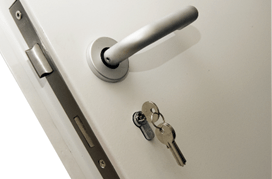
Main Lock
All exterior doors should have a deadbolt lock in addition to the lock built into the doorknob (with the exception of sliding doors). This should be high quality (Grade 1 or 2, solid metal with no exposed screws on the exterior), with a throw bolt (the bolt that comes out of the door) at least 1 inch (2.5 cm) long.
Additional Locks
Adding an additional lock will provide extra security when you are home. The deadlock is a deadbolt that is not activated by an external key. They are mostly visible from the exterior but the lock cannot be broken into without destroying the door, frame, or lock itself. While this security won’t help directly when you aren’t home, its visibility may discourage an intruder from trying the door.
Cylinder Guards
Installing a cylinder guard will prevent burglars from removing or damaging the cylinders by hammering, wrenching, or prying. Protect these with metal guard plates or protective rings on both sides of the door.
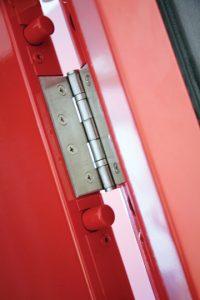
Strike Plates
This is the metal plate that surrounds the aperture in the frame where the lock bolt enters. All exterior doors should have heavy-duty metal security strike plates secured by four 3-inch screws.
Hinges
Hinges are the weakest area of the door and should be fitted on the inside; if yours are not, rehang the door or secure the exposed hinges with non-removable pins. For extra reinforcing around this area, Bradbury’s M2M+ doors have additional solid steel dog bolts which sit flush in the frame to prevent any attempt at forced entry.
Frame
Even if all of the above measures are in place, a burglar still may gain entry by prying or breaking the door frame, as most frames are tacked to the wall and easily separated by a crowbar. When replacing your entrance door, ensure that your purchase is primed for installation directly into the substrate surrounding the frame. If this is not a viable option, existing doors can be secured by installing 3-inch screws along the frame and doorstop.
Spy Viewer
Spy viewers allow you to see who is on the other side of the door. Install wide-angle viewers at eye level on all exterior doors to prevent giving burglars the opportunity to force the door whilst it’s being opened.
Security Rating
If you would like the assurance that your door has been externally tested and certified to a recognised insurance standard, Bradbury’s range of high security doors have undergone rigorous testing schemes by the LPCB to achieve LPS 1175 SR1, 2, 3 & 4. These doors are better suited to high risk establishments, and have proven popular with clients such as Telefonica, McDonalds and Portakabin. To find out more about the LPCB’s testing methodology, please visit www.bregroup.com.

The image above shows what is involved in the tests done to LPCB certify a door to Security Rating 1, 2 or 3.
If you are concerned about door security, you should be equally concerned about window security. Windows are often used as an entry or exit route for burglars, and should you leave them open or unsecured they become an easy target for potential thieves. Domestic windows in the UK are generally manufactured from the following materials: PVC-u, timber, composite materials (e.g. GRP), aluminium and steel. Many people are switching from windows with wooden frames to PVC-u construction due to their low maintenance, energy efficiency and higher levels of security.
Alarms
A simple method of protecting your windows is to install a sensor alarm, which detects when a window is opened or broken, sounding an alarm to warn your family and encourages the burglar to flee. Infrared motion detectors are also available, which monitor the area around the window and activates when motion is detected, before the window is opened or broken.
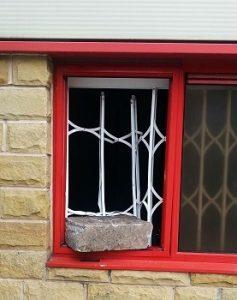
Grilles
Window grilles are especially popular with commercial premises, as they can be retracted during opening hours, but provide heavy duty security during periods where the property is unoccupied. Grilles which are certified to LPS 1175 Security Rating 1 (such as the Bradbury CX2 range) should be sufficient for a home that has secure entrances and an intruder alarm.
The image to the left shows the attempted forced entry into a property equipped with Bradbury grilles – as you can see, although the glass was smashed, the burglar was unable to enter.
Bradbury are also the only company worldwide able to produce LPS 1175 SR3 retractable security grilles, which are utilised by establishments requiring very high levels of security, such as the Ministry of Defence and Foreign and Commonwealth Offices.
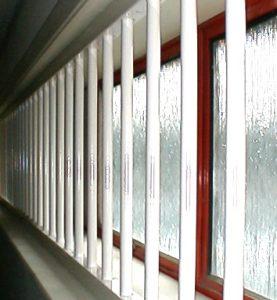
Bars
A serious addition to the security of your home or business, burglar bars installed on the ground level have proved a tried and tested deterrent. Even if a thief manages to smash through the glass, the bars will impede their ability to access the property. Bradbury’s Spartan bar sets are constructed from solid steel and are externally certified by the Loss Prevention Certification Board, which should help to lower your home insurance premiums.
Locks
If window bars or grilles are not an option for your property, the best visual deterrent for windows is a substantial lock that is visible from the outside. A window pin lock can be an affordable yet highly effective burglar deterrent, as can vinyl window locks. Security experts recommend to install strong, visible window locks on basement and first-floor windows, and simpler deadbolts or window sash locks on upper levels.
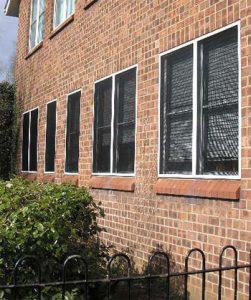
Security Film
This can be applied to existing glass, negating the need for expensive new glazing. Available in a range of thicknesses from standard safety film to bomb-blast protection, security film will allow the glass to withstand an amount of impact whilst also providing protection against accidental damage.
Anti-Vandal Screens
A cost effective solution to vandalism, Optiguard is an unobtrusive perforated steel mesh that’s fitted to the outside of windows to prevent glass being broken.
For free advice from our team of door and window security experts, please call 01724 271999 or visit bradbury-group.com.